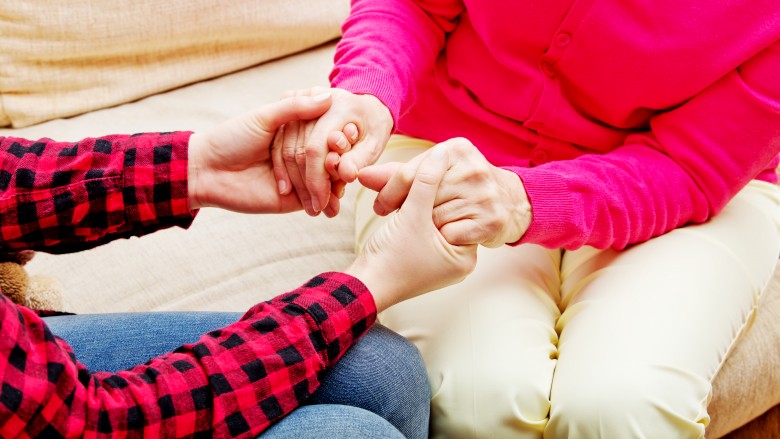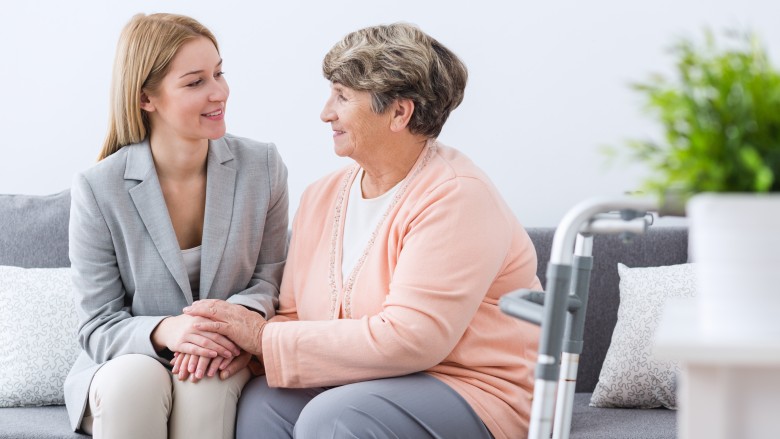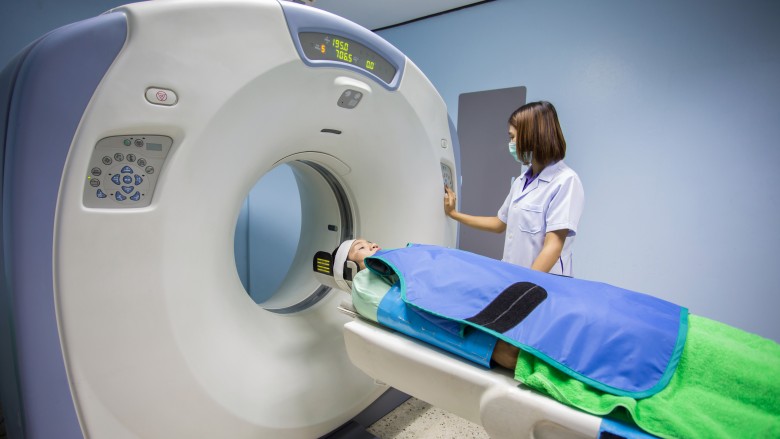8 Ways To Cope When Someone You Love Gets Diagnosed With Cancer
When one of your loved ones receives a cancer diagnosis, it's a life changing and terrifying ordeal to go through. After my mom was diagnosed, we were thrust into a new world with lots of confusing terminology, grim survivor rates and an uncertain future. It was a scary diagnosis, but it's not always a fatal one as many, including myself, jump to assume.
Many people who receive a cancer diagnosis simply live with it as a part of their daily lives. They undergo treatment or they are in remission — and I've even met patients who were still going to work with a stage four diagnosis due to ongoing palliative care and symptom management. A diagnosis is not the end, it's simply the beginning of a new reality. The new reality involves lots of diagnostic tests, waiting rooms, medications and many, many appointments. It can be a lot for one person to handle, which is why it's important for you to be there for your loved one.
According to the World Cancer Research Fund there were an estimated 14.1 million cancer cases diagnosed around the world in 2012, and that number is expected to increase to 24 million by 2035. That means a lot more people and their loved ones will be going through this unfortunate experience.
I spoke to a health psychologist and a nurse oncology navigator to gather some tips on how you can best cope when someone close to you receives a cancer diagnosis. After going through the experience myself, I believe that these tips will help you stay grounded, and be confident in supporting your loved one through their new healthcare journey.
Remain calm
Remaining calm is important for you and your loved one to stay healthy and in control. There will be many emotional moments during this journey that can overwhelm you both. You will go through a range of emotions, similar to the stages of grief — denial, anger, bargaining, depression and ultimately acceptance. Those are just your feelings, so can you imagine what your loved one is feeling during this time? It's important to face it together and support your loved one.
"It is important for at least one person to be calm, in order to make a plan, coordinate health care issues, and watch for mental health concerns as cancer patients often develop depression or brain fog," says Dr. Gretchen Kubacky, Health Psychologist. A cancer diagnosis is a heavy one, and it can weigh down your general mood and outlook — but it's vital to stay positive.
Focus on facts, not fear
Stay optimistic, and don't focus on other stats, other people's outcomes or what the internet says. Every person is different, every cancer is different and every diagnosis is different, so there's no point in getting worked up over other outcomes.
"When a loved one is diagnosed with cancer, their world suddenly stops. They usually only hear the word 'cancer' and their mind leaves the room and focus is gone," says Rose Wolfe, Oncology Nurse Navigator at St. Joseph Medical Center, Cancer Institute. Sometimes it's hard for a loved one to focus on the facts when they are overwhelmed. It's helpful to have someone with them to help understand the diagnosis, retain facts and ask questions they perhaps didn't think of.
Accompany your loved one to doctors' appointments
This is one of the most important things you can do with your loved one. They will likely be overwhelmed with a lot of information and emotions. Having someone by their side is comforting and will give you both a better understanding of what they will be facing in terms of upcoming tests and treatments.
"Patients are often bombarded with information and choices. Doctors may talk quickly, be rushed, or provide incomplete information in an effort to keep on schedule." explains Dr. Kubacky. "It's your job to listen, take notes, ask pertinent questions, organize paperwork, and help the patient stay as calm as possible." Wolfe agrees that as a support person, a family member can be their ears and eyes during a consultation. Sometimes it will be your job to advocate, as well — if your loved one has concerns, wants more answers or even a second opinion, this is where you can help be their voice and step up for them.
Ask questions and stay informed
Knowledge is power, but it can also be a weakness if you let the facts overwhelm or scare you. Staying informed is really important, but make sure you are researching from reliable sources. Stick to relying on your health care professionals for answers to any of your questions. Allowing patients to ask the "what if" questions allows them to focus on healing.
Wolfe suggests, "Sometimes we are afraid of the 'what if' questions, but once they are addressed, patients feel more confident in a plan." Being able to verbalize your concerns allows you to get the smaller elephants out of the room. Even though you absorb all the information you can it doesn't mean you will be able to change anything or make any different decisions. It's truly best to not jump to any conclusions no matter what the situation. Wolfe advises to "take it one step at a time, try to remain grounded in the present and not jump to the future."
Listen and support your loved one
Your loved one has a lot running through their mind as they go through their cancer journey — as do you. Talking to each other about your concerns and fears is difficult, but important. "As with any relationship, listening to concerns, validating them, and then offering support is the best way to exhibit your love." says Dr. Kubacky.
Most patients just want to be asked how they are, even though we know they are struggling through health issues. Make sure they know you are there to talk anytime they need. Some people find it hard to reach out, so reach out to them to see how they are if you haven't heard from them in awhile.
Support the decisions they make
What's right for you isn't necessarily what's right for your loved one. When it comes to making decisions — about anything — feel free to express your thoughts, but be mindful that it's their choice, and likely a hard one as it is. "It is important for family members to honor their loved one's wishes and ask how they can support them — try not to tell them what to do," Wolfe told me.
"Family members can tend to treat patients with 'kid gloves' and become overly protective. This can actually be very frustrating for patients." she says. Most patients want to live their lives the same as they already were pre-diagnosis, and most often they can. "It is good to allow the patient to remain in control, make their own decisions, and remain independent."
Ask how you can support them
For most people asking for help doesn't come easy, Dr. Kubacky told me "Many people are uncomfortable asking for help, or they are overwhelmed with the magnitude of the diagnosis." Making specific offers like driving them to appointments, picking up groceries or taking over big chores are small gestures that can really take a load off their shoulders. Sometimes a person might not even know they needed the help until you offered it.
Typically most patients do not want to be viewed as a burden and it truly helps them retain a sense of normalcy throughout their journey by being able to take care of themselves. "Family members can contemplate their own fears and get support, but it is also important for them to take care of themselves." says Wolfe.
Encourage self-care for your loved one and yourself
Dealing with a cancer diagnosis is stressful and draining for everyone involved. It shakes up your entire world and forces you to face some scary realities. That's why self-care is more critical than ever for you and your loved one. "Meditation, yoga, rest, relief caregivers, good healthy food and water — it all matters." says Dr. Kubacky. Engaging in healthy behaviors and a positive mindset will help you find the energy support your loved one as they fight the good fight against this disease.
Wolfe agrees, "Trying to maintain balance in mind, body and spirit is very important for all." Taking care of yourself will allow you to stand strong for your loved one and will give them the strength and inspiration they need for their journey. Don't be afraid to ask for help when you need it and encourage them to do the same, we are stronger together.
Extra tip: encourage prevention
This is one of the most important things that you can do to prevent cancer. Other than eating well, you should be exercising and abstaining from unhealthy habits like tobacco, alcohol and excessive sun exposure — it is the best thing you can do for yourself and your loved ones. It's recommended that after the age of 50 men and women should get screened every 2 years for breast or colorectal cancer. Encourage your loved ones to get screened regularly because most cancers can be caught and treated early. The best way to fight cancer is to get ahead of it!









